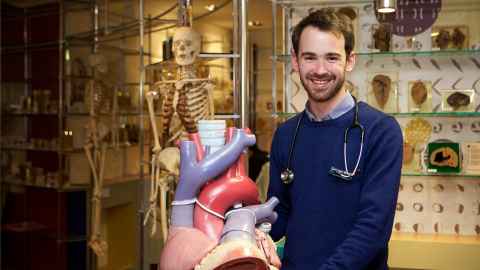Top ten tips for new doctors
5 December 2019
One year into being a doctor, Faculty of Medical and Health Sciences alumnus Dr Cameron Wells sits down and reflects on what he’s learned. Here are his top ten tips for recent graduates starting their professional life as junior doctors.

1. Be early and organised in everything you do
Show up to work early; be prepared and ready for the ward round. Make sure you know where the patients are, as you’ll likely be the one leading the team from room to room! Discuss scans and other investigations early in the day, chase the results and act on them early. It’s okay to ask for help when you need it, healthcare is a team sport. Call for help early if you’re worried about a patient.
2. The “two out of three” rule
To be a good junior doctor, you should be at least two of three things:
- Clinically good
- Nice
- Hard-working
To be great, you should try to be all three. On any given day, you can choose to be nice, and you can choose to work hard. Clinical excellence will come with time and experience, but if you work hard and be nice to people, you’ll go far!
3. Be available for your patients
Don’t resent being the first port of call for your patients. You will be called, paged and bleeped A LOT. If you’re being called, remember that it is probably because the person on the other end of the phone needs you to do a task or sign a document that they can’t do for the patient without your help. Even on your busy days, try to answer the phone with “What can I do for you?”
4. Know your patients
Know what is wrong with them. Make sure you understand (at least at a basic level) what the team is doing for each of them. And try to know something about each patient that makes them a human being, rather than just “the 62-year-old man with pancreatitis in Room 3B”.
5. Admit what you don't know
If you don’t know something, be honest. Don’t lie or make it up. It’s okay not to know the answer to everything, especially when you are starting out. It’s okay to say that you don’t know, but you’ll find out. And then make sure you find out. Anything less is a disservice to your patients.
It’s okay not to know the answer to everything, especially when you are starting out. It’s okay to say that you don’t know, but you’ll find out.
6. The patients come first
There will be some days where you need to stay late—that’s okay, it happens. Make sure your patients are well looked after. But also take the time to look after yourself—if you aren’t functioning, you won’t be there for the patients either.
7. See patients as people
Seeing patients as ‘work’ is a trap too many doctors fall into. These people have put themselves into out care and every seemingly ‘pointless’ job ultimately adds up to help look after them. Remember that everything is for the patients.
8. Focus on doing the basics well!
Don’t get too tied down in the intricacies of sub-specialty level management, but know that on some teams you’ll be the only one who cares about when the patient last pooped! Make sure plans are well-documented and followed through. Keep the team, the nurses, the patient and their family updated on how things progress, and try to keep an overview of the ‘big picture’—what does this all mean for the person in front of you?
9. Look after yourself and your colleagues
The first year out of medical school is a tough year for everyone. Try to make sure you get the right amount of sleep, nourish yourself with healthy food, and take time to exercise. Make sure you have people around to lift you up when things are tough. Stay connected with family, friends, and life outside of medicine, but also be there to support your colleagues—and they will be there to support you too when things get tough.
10. Communicate well
Your job as a junior doctor is going to be 10% medicine and 90% communication. You will communicate with patients, families, nurses, allied health professionals, other medical teams, GPs and more. Work on your communication skills and focus on developing them just as much as your knowledge!
Finally, celebrate! You’ve made it this far—you’re a doctor! This can be a tough job, but I’m convinced it’s the best one in the world, and I’m still learning more every day I’m at work. Remember to take your own pulse first, take a big breath and ask for help when you need it. You’re going to be great.
Dr Cameron Wells is an MBChB and BMedSc(Hons) graduate, and an Honorary Academic in the Department of Surgery at the Faculty of Medical and Health Sciences. He currently works as a junior doctor at Counties Manukau District Health Board.
Used with permission from Twitter, 25 November 2019.
This article reflects the opinion of the author and not necessarily the views of the University of Auckland.
Media enquiries
Nicola Shepheard | Media Adviser
Tel: 09 923 1515
Mob: 027 537 1319
Email: n.shepheard@auckland.ac.nz